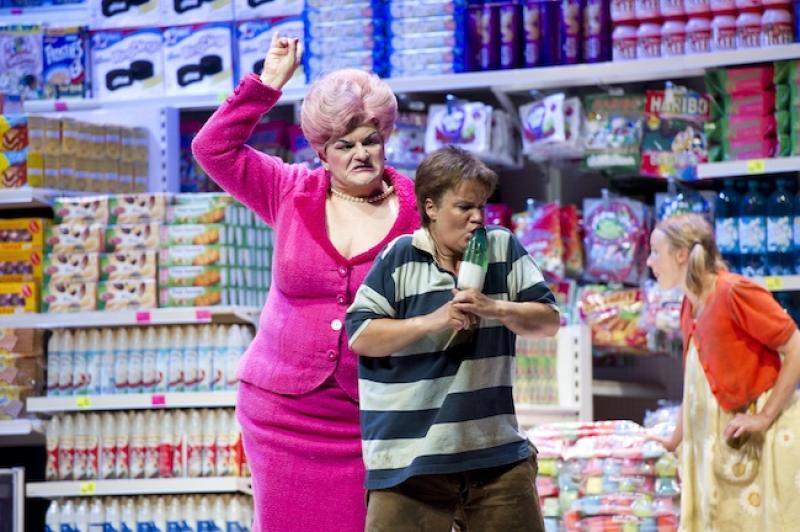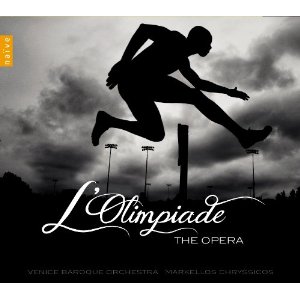Classical CDs Weekly: Berlioz, Humperdinck, L'Olimpiade | reviews, news & interviews
Classical CDs Weekly: Berlioz, Humperdinck, L'Olimpiade
Classical CDs Weekly: Berlioz, Humperdinck, L'Olimpiade
Olympic-themed opera, the best of all Brothers Grimm adaptations and Berlioz's infectious symphonic nightmare


Berlioz’s Symphonie Fantastique needs to sound sweaty and vulgar in all the right places. Over-manicured accounts rarely cohere; you need a conductor who’s willing to let Berlioz’s startling orchestral colours leap vividly off the page. An acid test is to sample the March to the Scaffold. Do the stopped horn notes sizzle at the outset, and do the bass drum thwacks make your speakers shake? Most importantly, how loud are the trombone pedal notes underpinning the cornet-heavy big tune? Robin Ticciati’s version hits the spot. Horns snarl, bassoons strut, drums pound and the trombones are suitably leery. In a work usually played by over-upholstered big bands, the Scottish Chamber Orchestra’s leaner, crisper sound is a breath of fresh air. They lend the closing Witches Sabbath extra bite and clarity, even if you might crave a bit more wildness in the closing minutes.
Ticciati’s patient, expository unwinding of the first movement’s opening paragraph is a delight – it’s as if you’re being drawn into a shaggy-dog story told by an old roué. As is the moment when Berlioz’s idée fixé takes wing, clean strings doubled by a wooden flute. Berlioz’s ball duly glitters (though without the neat cornet obbligato which he later added), harp glissandi nicely balanced. The central pastorale is expansive but tautly controlled. As a coupling, the overture to Béatrice et Bénédict fizzes as it should. Highly impressive stuff, and the wonderful Julio de Diego painting on the sleeve adds to the fun.

More from Robin Ticciati, and an example of why physical CDs will always score over boring downloads – this Glyndebourne live recording, taped in 2010, is brilliantly presented in bright sugary colours, the legible libretto encased within a mini hardback book. This is an easy opera to undervalue, still unfairly perceived by some as Wagner-lite, little more than inoffensive family entertainment. Humperdinck took some care to avoid the darker elements of the Brothers Grimm source material, where the parents callously abandon their offspring. But a good conductor will take pains to bring out the autumnal colours and highlight the shadowy corners in the score. Ticciati rightly lets his winds and horns steal the show; the orchestral playing here is in the luxury class.
Alice Coote and Lydia Teuscher are vocally well matched as the two children, both voices capable of singing really softly, really gently. Their Act II Evening Prayer is heart stopping, sung without a trace of artfulness. The ecstatic moment in Act III where the witch’s cottage is first spied takes on an extra dimension when you look at the booklet images showing Laurent Pelly’s visually startling production. Wolfgang Ablinger-Sperrhacke’s Witch is a brilliantly effective pantomime villain. The closing scenes carry plenty of emotional uplift; the gingerbread childrens’ transformation a glorious moment. Minimal stage noises and audience reactions add to the atmosphere.
Watch Wolfgang Ablinger-Sperrhacke in Glyndebourne's Hänsel und Gretel:

This opportune release is in effect an elaborate musical game of consequences, an opera posthumously written by 16 different composers. Pietro Metastasio’s Olympic-themed libretto was most famously set by Vivaldi in 1733. What we have in this recording is a pasticcio opera, a composite drawn from different attempts to recycle the same text. Several of the musicians' names are familiar, but few of us can claim to be familiar with the likes of Piccini, Caldara or Gassman. The producers have only chosen arias – there are no handy recitatives to explain what’s going on. So you need to sit down with the libretto for a couple of hours and absorb the sequence of solo numbers.
Metastasio’s rambling scenario sadly doesn’t allow for any onstage sport, focusing instead on what goes on behind the scenes as the King of Sicione prepares to host the Games. False names, deception, prophecy and suicide all feature. Amazingly, the piece hangs together pretty well. There are no obvious duds, though the best items do come from the few composers whose names are still remembered – a glorious Cherubini aria sung by Romina Basso’s Megacle in Act II and Cimarosa’s Non sò donde viene at the close of Act III, wonderfully delivered by tenor Nicholas Phan. The result is comprehensively annotated, very well recorded and beautifully played by Markellos Chryssicos’s Venice Baroque Orchestra. As an Olympic souvenir, it will provide more lasting pleasure than the Wenlock mascot currently gathering dust under your sofa.
Explore topics
Share this article
more Classical music
 Bell, Perahia, ASMF Chamber Ensemble, Wigmore Hall review - joy in teamwork
A great pianist re-emerges in Schumann, but Beamish and Mendelssohn take the palm
Bell, Perahia, ASMF Chamber Ensemble, Wigmore Hall review - joy in teamwork
A great pianist re-emerges in Schumann, but Beamish and Mendelssohn take the palm
 First Persons: composers Colin Alexander and Héloïse Werner on fantasy in guided improvisation
On five new works allowing an element of freedom in the performance
First Persons: composers Colin Alexander and Héloïse Werner on fantasy in guided improvisation
On five new works allowing an element of freedom in the performance
 First Person: Leeds Lieder Festival director and pianist Joseph Middleton on a beloved organisation back from the brink
Arts Council funding restored after the blow of 2023, new paths are being forged
First Person: Leeds Lieder Festival director and pianist Joseph Middleton on a beloved organisation back from the brink
Arts Council funding restored after the blow of 2023, new paths are being forged
 Classical CDs: Nymphs, magots and buckgoats
Epic symphonies, popular music from 17th century London and an engrossing tribute to a great Spanish pianist
Classical CDs: Nymphs, magots and buckgoats
Epic symphonies, popular music from 17th century London and an engrossing tribute to a great Spanish pianist
 Sheku Kanneh-Mason, Philharmonia Chorus, RPO, Petrenko, RFH review - poetic cello, blazing chorus
Atmospheric Elgar and Weinberg, but Rachmaninov's 'The Bells' takes the palm
Sheku Kanneh-Mason, Philharmonia Chorus, RPO, Petrenko, RFH review - poetic cello, blazing chorus
Atmospheric Elgar and Weinberg, but Rachmaninov's 'The Bells' takes the palm
 Daphnis et Chloé, Tenebrae, LSO, Pappano, Barbican review - lighting up Ravel’s ‘choreographic symphony’
All details outstanding in the lavish canvas of a giant masterpiece
Daphnis et Chloé, Tenebrae, LSO, Pappano, Barbican review - lighting up Ravel’s ‘choreographic symphony’
All details outstanding in the lavish canvas of a giant masterpiece
 Goldscheider, Spence, Britten Sinfonia, Milton Court review - heroic evening songs and a jolly horn ramble
Direct, cheerful new concerto by Huw Watkins, but the programme didn’t quite cohere
Goldscheider, Spence, Britten Sinfonia, Milton Court review - heroic evening songs and a jolly horn ramble
Direct, cheerful new concerto by Huw Watkins, but the programme didn’t quite cohere
 Marwood, Power, Watkins, Hallé, Adès, Bridgewater Hall, Manchester review - sonic adventure and luxuriance
Premiere of a mesmeric piece from composer Oliver Leith
Marwood, Power, Watkins, Hallé, Adès, Bridgewater Hall, Manchester review - sonic adventure and luxuriance
Premiere of a mesmeric piece from composer Oliver Leith
 Elmore String Quartet, Kings Place review - impressive playing from an emerging group
A new work holds its own alongside acknowledged masterpieces
Elmore String Quartet, Kings Place review - impressive playing from an emerging group
A new work holds its own alongside acknowledged masterpieces
 Gilliver, LSO, Roth, Barbican review - the future is bright
Vivid engagement in fresh works by young British composers, and an orchestra on form
Gilliver, LSO, Roth, Barbican review - the future is bright
Vivid engagement in fresh works by young British composers, and an orchestra on form
 Josefowicz, LPO, Järvi, RFH review - friendly monsters
Mighty but accessible Bruckner from a peerless interpreter
Josefowicz, LPO, Järvi, RFH review - friendly monsters
Mighty but accessible Bruckner from a peerless interpreter
 Cargill, Kantos Chamber Choir, Manchester Camerata, Menezes, Stoller Hall, Manchester review - imagination and star quality
Choral-orchestral collaboration is set for great things
Cargill, Kantos Chamber Choir, Manchester Camerata, Menezes, Stoller Hall, Manchester review - imagination and star quality
Choral-orchestral collaboration is set for great things

Add comment